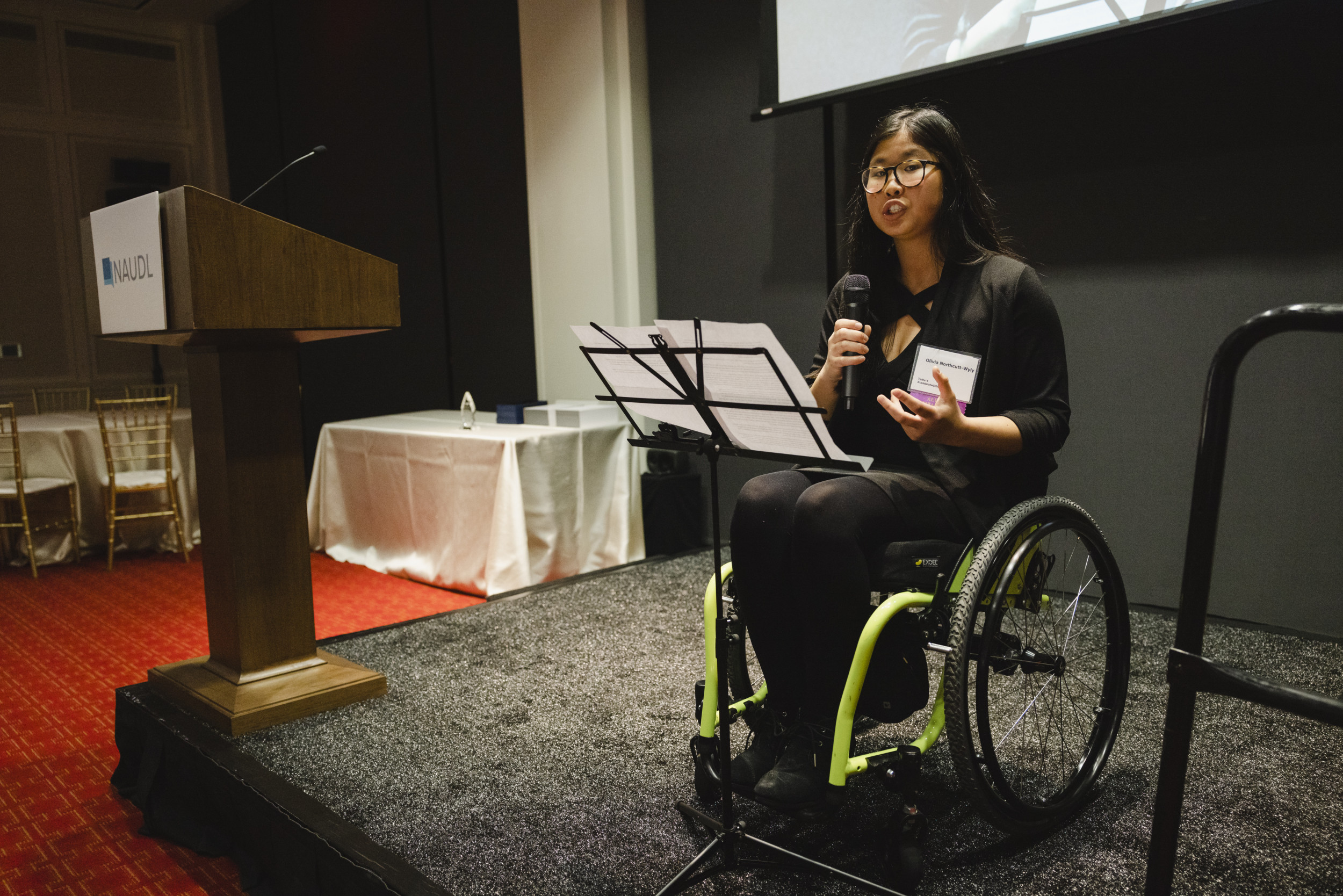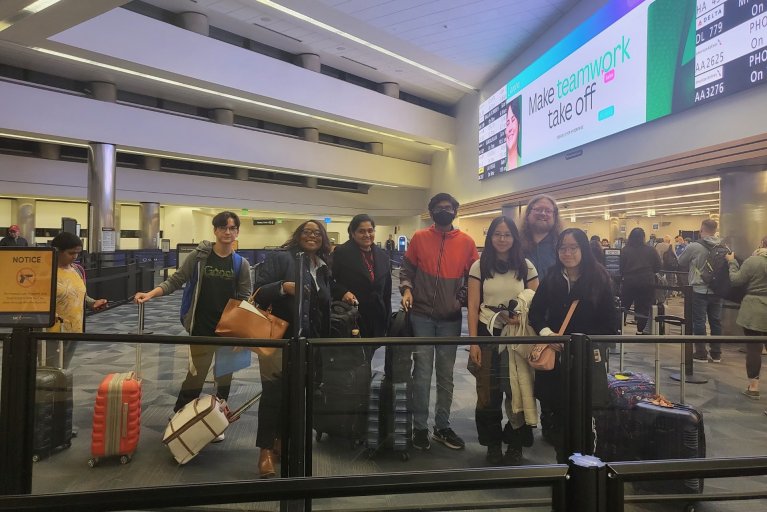Dec 21, 2023 At 11:33 AM EDT
Back in March, Olivia Northcutt-Wyly, 22, spoke before a crowd of current and former debaters about how the work they did in debate gave them "a path forward in life."
They were chosen as the alumni speaker at the National Association for Urban Debate Leagues' (NAUDL) Annual Dinner on March 30, ahead of the Urban Debate National Championships in their hometown of Dallas.
Northcutt-Wyly, a senior at the University of Southern California (USC), is an alum of the Dallas Urban Debate Alliance (DUDA) and was honored in 2020 as the NAUDL debater of the year.
In their speech, Northcutt-Wyly, who is fully dependent on a wheelchair for mobility, spoke about how their experience debating and formulating arguments inspired them to become an advocate for people with disabilities and to work to eliminate inaccessibility and inequality in public spaces.
Through their work, Northcutt-Wyly was able to get their high school to implement wheelchair-accessible tables, bathrooms and lunch lines, widen ramps leading into the building and make the school parking lot compliant with the Americans with Disabilities Act (ADA).
The world may be inaccessible, but that doesn't mean it has to be, Northcutt-Wyly noted in their speech.
"It is crucial that we strive for inclusivity and accessibility in this activity so more people can experience the transformative power of debate," they said.
Northcutt-Wyly started debating in middle school because they were looking for social connection and "a sense of self" after suffering an injury that prevented them from swimming.
"What drew me in was the community," they told Newsweek in a recent interview. "It was just having something to do on the weekends [and] getting away from my home life. So it was an outlet."
Northcutt-Wyly also credits the adults in the debate space for encouraging them and supporting them in the activity. They went to debate camp, where they met mentors and college professors who guided them. But it all started with a great high school debate coach.
"I had a really nice debate coach," they said. "Honestly, it's really the coaches that matter. She welcomed me to the team, and I met my best friend there."
Math teacher and debate coach Mary Gregg first met Northcutt-Wyly when they were a student in her ninth grade pre-calculus class in 2016, before they joined the debate team later that year.
"Olivia is one of the most thoughtful people I have ever met," Gregg told Newsweek over email. "As a debater, Olivia was formidable and well-known as an intimidating opponent. In high school, they won top speaker at almost every tournament, setting records for our school and also for Dallas Independent School District."
As a policy debater, Northcutt-Wyly read more kritikal arguments that they said look at "bigger picture, structural issues." As they debated and met more people, they crafted a debate identity focused on issues close to home.
"I got really passionate when I met other disabled debaters," they said. "And I started to develop disability-study arguments, looking at structures and how topics can perpetrate ableism and how the fast nature of debate can be hard for debaters to access."
Gregg said Northcutt-Wyly developed their advocacy skills alongside debate.
"As Olivia transitioned to life using a wheelchair, they became very aware that their school and debate was not designed for wheelchair users," she said. "In these projects, Olivia was unafraid to meet with the principal and the instructional leadership team, citing the ADA like the back of their hand."
After graduating from high school in 2020, Northcutt-Wyly received a full scholarship to debate at USC. There, Northcutt-Wyly was able to expand upon their kritikal arguments to examine neoliberalism and capitalism.
Northcutt-Wyly is majoring in public health policy while simultaneously working on their master's degree in public health. This path was directly carved out throughout years of debating about the health care system and advocating for people with disabilities.
In addition to the vast amount of research debaters undertake, Northcutt-Wyly said kritikal debaters are especially primed for activism in their communities.
"Debate is not just an activity for us—the books we read, the scholars we interact with, the lectures that we attend, those are all very personal things," they said. "I think what's beautiful about debate, and what can be hard, is when you're debating, sometimes you're debating your own identity. And in that way, you're understanding the unique perspectives of people on different policy issues."
In college, Northcutt-Wyly has been heavily involved in efforts to make California and the USC campus more accessible. Through their work, Northcutt-Wyly not only made a difference, but found community and raised awareness about the realities of people with disabilities. They worked for Disability Rights California, a nonprofit agency that protects and advocates for the rights of Californians with disabilities. Northcutt-Wyly did pro-bono work, helping people connect to lawyers and other support and resources they need.
"I would listen to their stories, and I really kind of started to understand a different perspective, because obviously, not all disabilities are the same," they said. "I heard stories from people with intellectual disabilities and people with physical disabilities. And that really got me well-versed into the world of disabilities."
USC's campus is "pretty accessible," Northcutt-Wyly said, but "there are definitely things that need to be improved."
They are working with the residential education department to figure out how to make freshman events more accessible and how to bring wheelchair sports to campus.
These efforts have been challenging, what with the bureaucracy of the college world. One of the pieces of feedback they've received is that there aren't enough people with disabilities at USC to make big changes. Northcutt-Wyly said this isn't an accurate statement.
"We tend to only think about people with disabilities who are in wheelchairs or have more severe disabilities," they said. "Through my research and debate, I've learned that disability looks different in a lot of different contexts. It's actually factually inaccurate to say that there's not enough people with disabilities in order to do advocacy work."
And the issues with accessibility do not stop with athletics. Northcutt-Wyly said elevators are often turned off and mailrooms in student housing are largely inaccessible. Spreading awareness of these issues, Northcutt-Wyly said, is a major part of the work so people can put pressure on the university to take action.
"I know those seem like small things, but they can definitely make a difference in college students' lives because those are just mundane activities that we shouldn't have to think about," they said.

Northcutt-Wyly has also taken on the role of advocate in the debate realm as well. They actually stopped debating during their sophomore year in college due to their disability, but they help coach novices on the USC debate team and teach speech and debate to students in China and Australia. Northcutt-Wyly has also worked with NAUDL and several Urban Debate leagues as an instructor, curriculum developer and tournament coordinator. In doing so, Northcutt-Wyly has learned about the barriers of entry to policy debate and the inequities in debate.
"I learned how inaccessible debate was not only through firsthand experience, but also as a coach," they said. "Debate tends to privilege those who speak English or who can speak really fast or have certain abilities or have the coaching staff."
Accessibility is an issue in the debate world, not just from a disability perspective, but from a socio-economic perspective as well. Northcutt-Wyly said NAUDL does great work in this area, by bringing in debate students from all backgrounds. But more can be done to ensure urban debaters have access to opportunities beyond their leagues. The Urban Debate circuit is still small, and most urban debaters cannot access bigger, national circuit tournaments.
"We debated the same teams over and over and over again [in NAUDL]," they said. "While that can be super-valuable and build connections, we didn't get a chance to learn from other people, learn from other debaters and grow in that aspect."
This becomes a problem especially when urban debaters want to continue debating in college—where teams are mostly comprised of debaters who have several experienced coaches and could hire someone to cut cards for them.
Northcutt-Wyly has been fortunate enough to build upon the skills they learned in middle and high school debate to discover their passion and purpose in life. Now a senior, Northcutt-Wyly is pondering their next steps. They are considering studying disability law in law school, or pursuing their Ph.D. in bioethics to understand the ethical circumstances of different medical procedures. Either way, they will bring their unique perspective—which combines their philosophical debate background with a knowledge of policy and their own personal identity—to make a difference.
Whichever path they take in their professional career, Northcutt-Wyly wants to remain involved in the Urban Debate space. In their speech at the NAUDL Annual Dinner in March, Northcutt-Wyly said that debate taught them the skills necessary to reach solutions and convey ideas effectively to adults, administrators and policymakers.
Mary Gregg, Northcutt-Wyly's former teacher, said debate has "plenty of room to grow" regarding accessibility for people with disabilities, but she is hopeful that the activity is heading in the right direction.
"I recently served as a judge in an elementary school debate where one student used a wheelchair," she said. "I know that Olivia is not the direct reason that this student participated, but I do know that they paved the way for other students."








